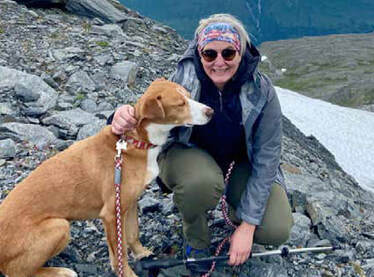Notes on COVID-19 by Dr. ANDREA Caballero
As Christmas nears, and with the vaccine on the horizon, it remains essential to take protective measures against the spread of COVID.
“I think the most important thing during the upcoming holidays is to grin and bear,” said infectious disease doctor Andrea Caballero. Caballero grew up in Guatemala and now has a private medical practice in Anchorage. She worked for a few years on the Kenai Peninsula. During the pandemic, she’s seen many COVID cases in her practice — at least seven active cases in the past week. Data from the Alaska Department of Health and Human Services estimated that there were more than 100 hospitalized for COVID-19 on Dec. 11 in hospitals around the state. That number reached a peak last week, with more than 160 reported hospitalized cases. Many of those who have been testing positive for COVID-19 don’t have symptoms. That can give those cases, known as “asymptomatic carriers,” a false sense of security, even when they’re contagious and can infect other people who may become more seriously ill. That’s one of the reasons the city of Anchorage recommended that everyone receive a coronavirus test, regardless of symptoms. Caballero said there are people who don’t want to be tested because they worry about the restrictions that come with a positive result. “People say, ‘If I get tested, then I can’t go to work, then my kids can’t go to school, when school is open,’” Caballero said. But these results can prevent asymptomatic carriers from spreading the virus. And the tests are free. For a list of free test sites, go here: covid-response-moa-muniorg.hub.arcgis.com/pages/testing. In all cases, it is important to maintain an exclusive social bubble, ideally consisting only of people in your home. It’s also important to make sure that the people in your bubble do not have other bubbles, which creates an exponential effect. “So, our social circles are much larger than we realize,” Caballero said. Keeping the bubbles small also makes it easier to identify the roots of an infection. The growth in cases has complicated and delayed contact tracing efforts. One worrying trend is the proliferation of misinformation about the virus and the vaccine, exacerbated by social media. “I think the most important thing with regards to misinformation is to not believe anything that appears on Facebook,” Caballero said. “I’m not on social media because of that.” The most reliable information comes from the Centers for Disease Control and Prevention, or CDC. You can view that information on their website in Spanish, at cdc.gov/spanish. To help Spanish speakers, Anchorage hospitals use a language phone line that functions as a virtual interpreter. There are also many Spanish-speaking medical providers who can help, Caballero said. The first wave of vaccines coming this week is going to be limited to high-risk populations, like doctors and people in long-term care. Caballero said that each vaccine has the potential to produce side effects. But the risk of contracting COVID is much more significant. “It won’t be perfect, but I will be first in line to get it when I can,” she said. |
